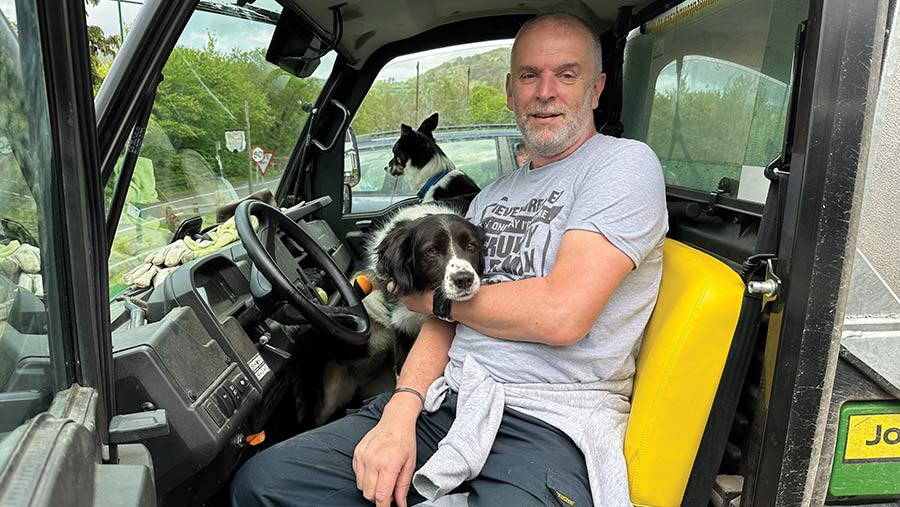Farm Doctor: Breaking down barriers to men’s health
 © ml1413/Adobe Stock
© ml1413/Adobe Stock It is no secret that farmers can be notoriously bad at seeking help when something is wrong.
Often working long and solitary hours, health and wellbeing concerns are left unvoiced, and, for many, a stigma still exists around reaching out for help.
See also: UK’s biggest combine journey in aid of mental health charity
To mark Men’s Health Month, a campaign to raise awareness for men’s physical and mental health and wellbeing, Farmers Weekly spoke to farmer’s daughter and qualified doctor Camilla Baker to separate the myths from the facts on a topic that affects many men across the country: prostate cancer.

© Camilla Baker
What is a prostate?
According to a recent study carried out by charity Prostate Cancer UK, 74% of men do not know what their prostate is or what it does, and a further 44% do not know where it is.
“The prostate is a gland that sits near the bladder, and is about the size of a walnut,” says Camilla. “It makes the fluid that carries sperm, so every male will have a prostate.”
In the UK, more than 52,000 men are diagnosed with prostate cancer each year, equating to around 140 people a day.
This means that around one in eight men will be affected by prostate cancer in their lifetime, making it the most common type of cancer in men.
“Because it is so common, the positive here is that we have a lot of information on it,” says Camilla.
“This means that when it comes to diagnosis and treatment, there is so much data that can be used to drive the decisions we make.”
Cancer is caused when cells start to divide and grow at a higher rate than normal cells. “When this happens, they can form a tumour,” says Camilla.
“These can be slow growing, or, sometimes, this can happen really rapidly, causing the cancer to spread.
“Treatment will depend on the rate at which this is happening.”
Symptoms
For the vast majority of men diagnosed with prostate cancer, the disease will be asymptomatic, meaning it can often creep up without any markers.
“Because most people don’t actually present any symptoms, it’s really important to recognise the risk factors,” says Camilla.
“These include being male and over the age of 50, and having a family history of prostate cancer, especially if it has affected a father or brother.
“This is really important and should encourage men to go and get themselves checked out.”
Where symptoms do present themselves, difficulty urinating or emptying your bladder can be an early sign.
“A weak flow or feeling like you’re not fully emptying your bladder, and an increase in frequency, such as waking up in the middle of the night to use the toilet, can be the symptoms that people may experience.
“With more advanced disease, symptoms could include pain in your hips, pelvis or back, and blood in urine or semen.”
Risk factors
- Male, and over 50 years of age
- A family history of prostate cancer, particularly affecting a father or brother
- Being from black Afro-Caribbean background
- Some evidence suggests that a high fat diet can also be a risk factor
Getting tested
In the UK, there is no routine screening procedure for prostate cancer, which is why it is so important to recognise risk factors and symptoms, and break down the stigma associated with being tested.
“When you go to the GP, the first thing they will do is a urine dip-stick test to determine whether any symptoms are the result of a urine infection,” says Camilla.
“Then they will do a blood test called a prostate-specific antigen, or PSA, test. This can indicate whether the prostate is enlarged or growing at an abnormal rate, but it is not very specific.
“PSA levels could be raised because of cancer, or they could be raised following a urine infection, rigorous exercise, or due to non-cancerous growth,” says Camilla.
Symptoms
- Difficulty starting to urinate or emptying your bladder
- A weak flow when you urinate
- A feeling that your bladder hasn’t emptied properly
- Needing to urinate more often than usual, especially at night
The PSA test alone fails to detect around one in seven cases of prostate cancer.
“This is why we don’t just look at the test alone,” she adds. “As part of your screening you would also have an examination, called a digital rectal examination.
“This involves examining the prostate for any irregularities. It should feel smooth, but if it feels bumpy, that would be an indicator that it is growing in an abnormal way.
“There is a stigma around the test, and it is something that completely worries people and puts them off.
“The important thing is that, even though it is uncommon for the person going for the test, it is something that we as doctors do all of the time, and it is a relatively quick and painless process.”
Breaking the stigma

© Gareth Edwards
Retired Welsh livestock farmer Gareth Edwards was diagnosed with prostate cancer in 2019.
Just 57 years old at the time of his diagnosis, Gareth has since been urging more men to get tested and to break down the stigma surrounding prostate cancer by taking to Twitter to vlog about his experiences.
“Blokes don’t talk,” he says. “They don’t talk to each other, they won’t tell their wives or their partners, and they won’t admit that they might be struggling to pee, or getting up two or three times in the night to go to the loo.
“They won’t go to the doctors, they won’t go and get it checked out, even if there is an indicator that something is wrong,” says Gareth.
“The worst thing for farmers is that we work by ourselves. We’re insular and might not see anybody for days until it’s time to go to the market. But even then, it’s often the last thing you want to talk about.
“Men think that talking about it is a sign of weakness in other people’s eyes – but I say bollocks to that.
“Nobody wants to go through the process of being diagnosed with prostate cancer, but doing something about it early on and having early detection is the key.”
Having suffered from prostatitis for 10 years prior, Gareth went to see his GP after new symptoms were presented. After further testing and an MRI scan, he was diagnosed with prostate cancer.
He is now clear of the disease, but keeping a close watching brief in case it returns.
This is the first in a new occasional series, in which farmer’s daughter and practising doctor Camilla Baker will explore different physical health challenges confronting men and women in all walks of life.

